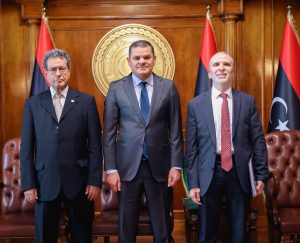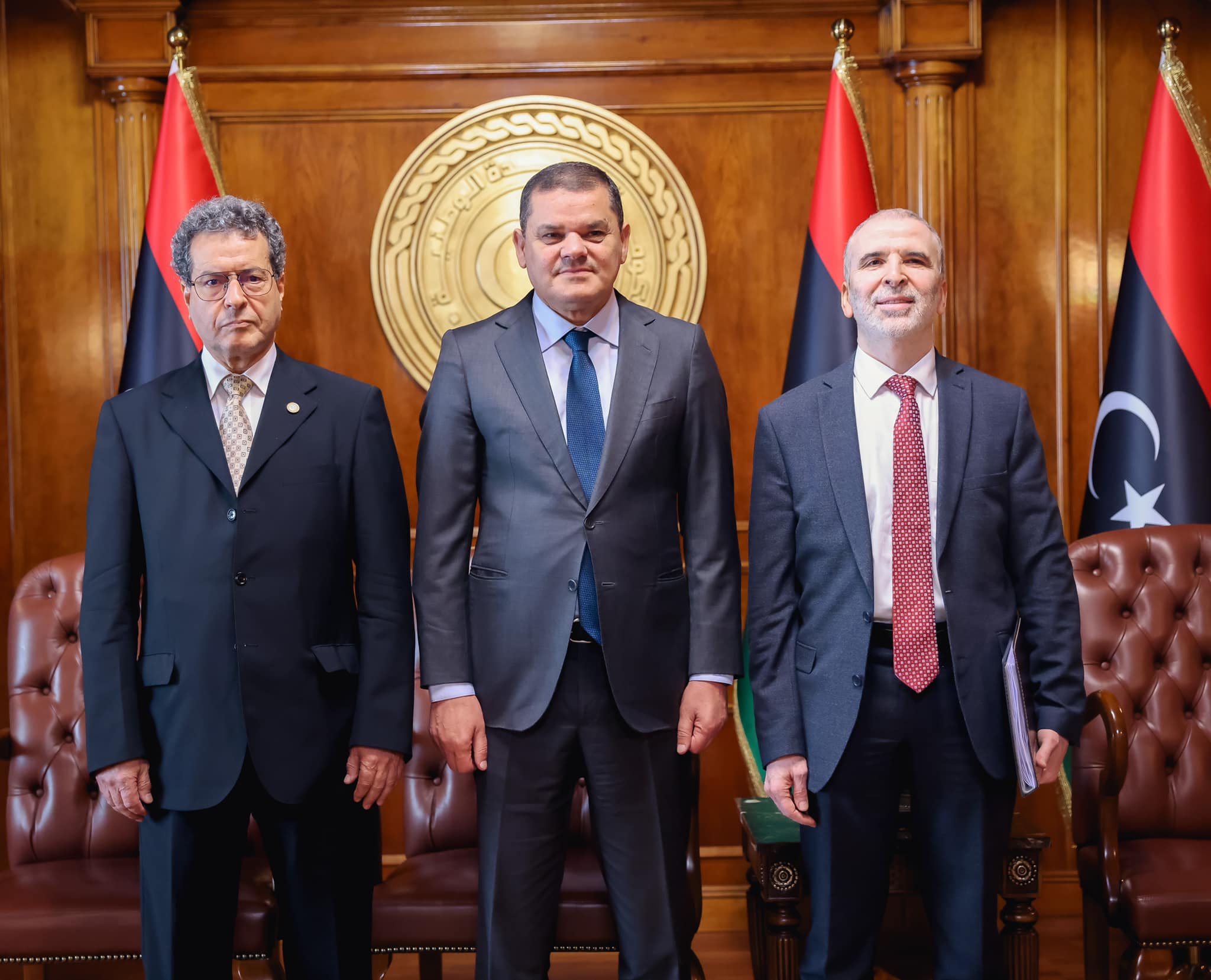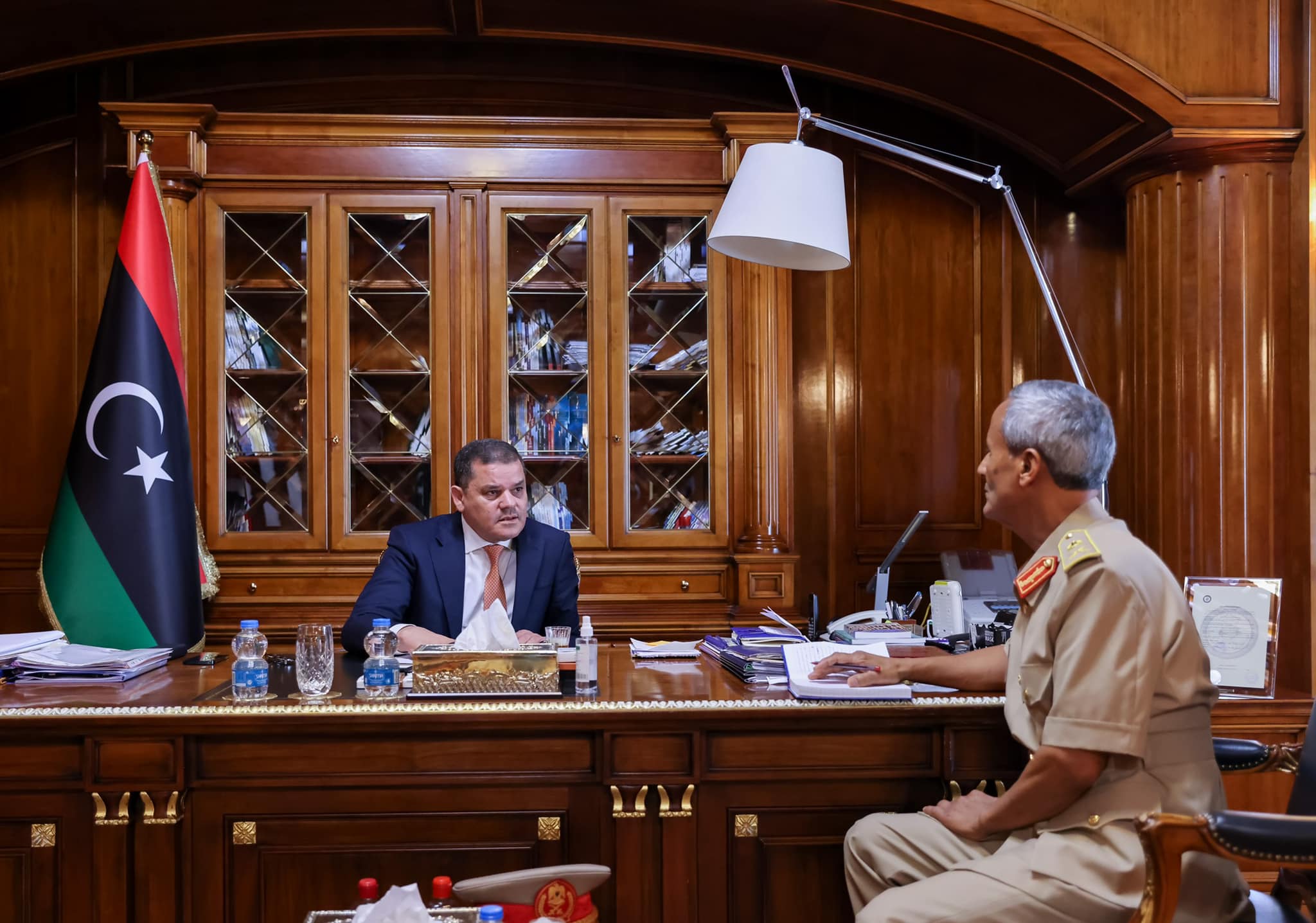By Sami Zaptia.

London, 6 September 2021:
Libyan Prime Minister Abd Alhamid Aldabaiba took no major action after his oil summit meeting yesterday with the warring Oil Minister Mohamed Aoun and National Oil Corporation chairman Mustafa Sanalla.
Both have ostensibly kept their jobs after a kiss and make up meeting where he seemed to have dished out no more than the proverbial slaps on the wrist.
The meeting was officially billed as a ‘‘follow up on oil affairs’’ and a review of ‘‘the problems’’ the oil Ministry faces by the Prime Minister.
The official government statement on the meeting said the Prime Minister opened the meeting, ‘‘stressing the importance of stabilizing the sector, working to increase production’’, and that he would ‘‘not allow any administrative or technical obstacles to stop it.’’
The statement continued adding that Aldabaiba had listened to several remarks made by the Minister and Deputy Oil Minister, as well as the head of the NOC, ‘‘regarding the emerging work mechanism’’.
The Prime Minister considered that ‘‘the creation of the Ministry (of Oil) after six years of the NOC working on its own requires an administrative and technical organization that creates an appropriate hierarchy’’.
The statement concluded that Aldabaiba had given ‘‘the necessary instructions to address the problems that were recounted, and not to allow their recurrence, regardless of the reasons, considering that the oil sector concerns all the Libyan people, and any procedures in it, whether administrative or technical, require wisdom’’.
Analysis
Deciphering the official statement on the summit it seems that Aldabaiba has chosen to put the clash down to an ‘‘emerging work mechanism’’, ‘‘administrative or technical obstacles’’, ‘‘the creation of the Ministry (of Oil) after six years of the NOC working on its own’’ which meant ‘‘an administrative and technical organization that creates an appropriate hierarchy’’ is now required.
He also put it down to a lack of ‘‘wisdom’’ by either or both Aoun and Sanalla.
Beyond the official government report of the meeting, we don’t know what was really said in the meeting by both to each other or to both by the Prime Minister.
A slap on the wrist and a return to the status quo ante
Libya Herald had questioned (on 2nd September) whether Aldabaiba would sack Aoun as he could have been the easier one to sack and since Libya has survived for decades without an Oil Ministry. Aldabaiba referred to that very same fact in his statement yesterday.
The Oil Ministry was only recreated for logistical / political reasons: to satisfy enough regions, tribes, and House of Representatives (HoR) members in order to create enough ministries to get Aldabaiba his government approved by the HoR.
At the end, Aldabaiba went for the easiest of all options: dishing out a quick slap on the wrist and keeping both men in situ.
Do they both mean well?
The question will be now: have both men learnt their lessons and can they continue to work together in Libya’s most important sector without friction and public fallout? It will be a test of the two men’s real character and intentions.
Clear mechanism and division of authority
It will also be a test of Aldabaiba’s ability to create a clear mechanism of the divisions of power and authority between the two entities so that there is no overlap and stepping on each other’s toes.
Aoun’s decisions now null and void?
It is assumed that a reset to the status quo ante has now been pressed after Sunday’s meeting. Sanalla is neither suspended nor, publicly at least, admonished for travelling abroad without his Minister’s permission.
It also assumes that his referral to investigation and the appointment of his temporary replacement, Jadalla Oakely, is now also null and void.
Who is the winner?
In the political battle between the minister and the chairman, it seems the chairman has come out on top.
All of Aoun’s decisions have been reversed. Sanalla ripped Aoun apart in his video onslaught in which he defended his actions and decisions. In it, he questioned Aoun’s integrity and acumen as a minister. Many ministers would not have stood for that.
Logic would have presumed that both could not continue working together. In a developed democracy, Aoun would have given his Prime Minister an ultimatum: It’s me or him, back me or sack me. And if his Prime Minister did not back him, he most probably would have resigned on point of principal. It is unclear if Aoun did put Aldabaiba on the spot and neither man has resigned.
Sanalla backed by foreign states?
But the incident is also a good indicator of Sanalla’s standing or power – depending on how you want to look at it. Aoun had raised question marks on Sanalla’s integrity too by suggesting he was only in post because of the backing of certain foreign states. These words may have been said in anger, but they are now out there, and they cannot be unsaid. They resonate with the Libyan public, and they will be a cloud over Sanalla’s head as long as he is in office. Some might say they have tainted him for life.
But, when push came to shove, Aldabaiba did not back his minister against Sanalla. Does this explain Aldabaiba’s weakness and fear of rocking the boat if he sacked Sanalla – or does he view Sanalla as the innocent party in the spat and an excellent chairman of the NOC?
Did foreign states lobby on behalf of Sanalla or even pressure Aldabaiba into keeping Sanalla in his job?
Whatever the real reasons for Aldabaiba’s decision to keep to the status quo, in theory, Libya should be having an election on 24 December 2021 – so the government has less than four months in power. It is to be seen if both Aoun and Sanalla can continue to work together for this short period of time – without either or both losing their jobs – or rocking the stability of Libya and its government.









